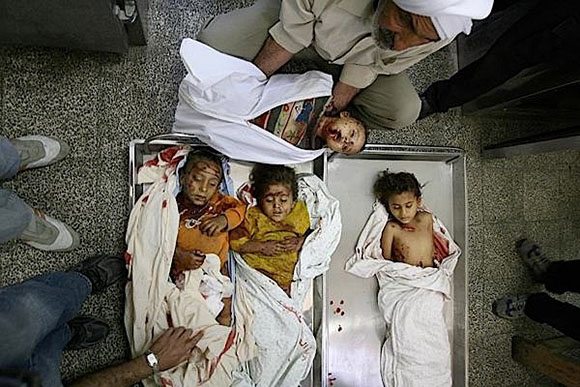In Gaza’s stifling midday heat, grieving relatives of a family killed in an Israeli air strike sit outside a mosque, weary from their Ramadan fast and nervously anticipating the next deadly blast.
The mourners, most of them men, have come to bury six members of the Hammad family, including a teenager and two women, killed when a missile slammed into their home in the northern Gaza town of Beit Hanun.
The air strike came around midnight, just as Hafez Hammad, a senior Islamic Jihad commander, was returning home, relatives say.
He was killed along with two male relatives, two women including his wife, as well as his 16-year-old niece.
“They were a whole family, they were respected people here,” says 21-year-old Mohammed Hammad, a family member.
“Now there’s only the grandfather and one of his sons left.”
A mourner fires several shots into the air as the bodies are brought out of the mosque on stretchers, smelling of perfume after the embalming ritual.
Local youths jostle for space around a small truck as the bodies, one wrapped in a Palestinian flag, are loaded into the back.
Mourners wave flags of various Palestinian factions, including the green of Hamas, the black of Islamic Jihad and the yellow of Fatah.
The procession shuffles along slowly to a cemetery several kilometres (miles) down the road, a loudspeaker belting out eulogies to the dead.
– ‘Four-minute warning’ –
Another family member relates how Israel had fired a warning shot shortly before the air strike, sending most occupants of the building fleeing in terror.
Several minutes after the warning, a missile flattened the building.
“They fired a light warning strike which hit the roof causing limited damage, then four minutes later they fired the second,” Khaldun Hammad tells AFP.
“There were three families living in the house, some 30 people, and only one wanted man. But the Israelis bombed the whole thing anyway,” he says.
All that remains of the building is a huge crater in the ground, half filled with rubble, twisted metal plates and shredded furniture.
Uprooted palm and olive trees litter the ground, strewn among the debris.
“Four minutes isn’t even enough time to gather your basic belongings,” says Mohammed Hammad.
So far 43 Palestinians have been killed in hundreds of air strikes since Israel launched Operation Protective Edge early on Tuesday. Over the same period, 130 rockets have struck Israel, but so far, nobody has been hurt.
A short distance away, ambulances pull up every few minutes at a small, crowded hospital.
Hospital staff and police try to console the wailing relatives of a man with a severe head injury, and a four-year-old girl looks uncomfortably away as a nurse treats her wounded hand.
“We’ve had three dead here today,” says one worker, declining to show the bodies.
As another ambulance arrives, two massive bangs shake the area, and a plume of smoke rises into the sky a few hundred metres away.










